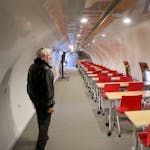Harvey Novick replaced some shock absorbers on a 1979 Buick wagon the other day. Then he hung up his wrench, quietly ending three generations and 85 years for Novick's Super Service, a little brick auto repair shop and time capsule at Snelling and Stanford Avenues in St. Paul.
A receipt from May 24, 1935 — documenting the sale of 5 gallons of gas for 88 cents — is taped above the ancient roll-top desk.
Harvey's late father, Joe, bought the desk decades ago from a used furniture store. The salesman told him it came out of the State Capitol.
"I put in my time," Novick said Friday, preparing the place for a farewell party for his customers. "I've been planning to retire for a couple of years, and I'll miss the clientele more than anything."
His grandfather, Abe, emigrated from Russia in the early 1900s, settling with his fellow Jews on St. Paul's West Side flats. A carpenter, Abe found work where he could, repairing steps and performing other odd jobs until he saved up enough money to bring over his wife, Bertha. They had three children — Rose, Joe and Louie — who grew up in the bungalow Abe built next to the shop.
Envisioning a 20th century built around cars that needed gas and repairs, Abe hired a couple of brick masons who lived nearby. They used golden glazed bricks on the front, Snelling-facing side of the shop and old crummy seconds from the brickyard for the rear. Harvey can point out the blue house on Brimhall Street where the masons lived.
Abe also built a grocery store next door (now Brinkman's Lighting), which Bertha managed. He went on to construct houses in Highland Park for each of his kids, plus two other gas stations in the neighborhood, which have long since vanished.
Over the years, Novick's sold Pure Oil, City Service, Gulf and Mobil gas until Harvey pulled out the underground gas tanks in 1991 to focus on repairs. Harvey's shop is believed to be one of the oldest continuing running auto repair shops in the Twin Cities.
Harvey graduated from St. Paul Central High School in 1957 and joined the U.S. Navy for a two-year hitch.
"I came home in 1960 and have been here ever since."
His three grown children — Scott, Jon and Susan — showed no interest in carburetors or oil changes. So Harvey will sell the shop and the family home. His real estate agent told him whoever buys the property probably will tear down both structures along with all that history.
Harvey recently sold some Pennzoil signs to collectors for $200, not to mention his wheel balancer and tire changer. There's an 80-year-old press for ball bearings he still hopes to peddle.
"That's an antique."
But asked what will happen to the wooden work bench Abe built in the 1920s, the same bench he and fellow mechanic Tony Carpenter continued to use until the end, Harvey shrugged. Was he sad after changing those last shocks?
"Nah," he said. "I was happy. I put in my time."
Curt Brown





